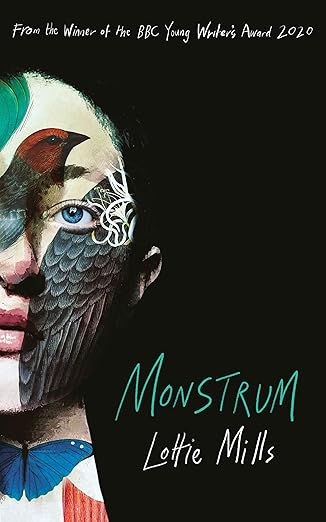Monstrum
- Jul 15, 2025
- 2 min read
Reviewed by Olivia Ackers
by Lottie Mills (Oneworld Publication: 2024)

In 2020, Lottie Mills won the BBC Young Writers’ Award for her short story, ‘The Changeling’, after being shortlisted in 2018. This is the first story to feature in her debut, Monstrum.
This short story collection heavily depicts the pains of disability through the lens of horror and supernatural tales. As well as this, all the stories in this collection demonstrate the animosity of humans in comparison to the prejudiced monstrosities of supernatural creatures.
As is the case with many short story collections, there are incredibly strong ones– like ‘The Toymaker’s Daughter’ and ‘The Body’, and some that are still well-written and enjoyable, but didn’t impact me as deeply. However, every single story was crafted incredibly intentionally with Mills’ proficiency in writing being abundantly clear. Her ability to create such poignant narratives through a limited word count was impressive. Alongside this, the stories all evoked such strong emotional reactions from me with such strong ties to what I can gather as her own experiences of disability, and that is something that is invaluable.
Horror, as a genre, has always been used as an exaggerated way to critique something within society. It enables the writer to deepen the meanings and stories behind the bogeyman, what does s/he represent to the author and in extension, the readers?
In Mills’ case she illustrates the restrictions and pains of disability through the lens of horror. The short stories ‘The Toymaker’s Daughter’ and ‘The Body’ exhibit Mills’ critiques of society’s perspective of disability, viewing it as a flaw rather than an aspect of a human’s living experience.
Both stories feature a separate able-bodied alternative that is viewed as perfect in comparison to the ‘uncooperative’ and ‘dysfunctional’ disabled body (p. 68). In the case of ‘the Toymaker’, this is a doll replica of the titular character’s daughter, and the perfect body modified by science, abandoning the body they were born in, shown in ‘The Body.’ These stories focus on the idea of an able-bodied substitute that could fulfil a role within society, be viewed as normal and human and not an ‘abnormal shape’ as is defined by the introductory definition of the word ‘monstrum.’ (Introduction, p.10)
Overall, Mills uses the idea of abnormality to highlight the prejudices that disabled people still face within society. They face questioning about their condition, are forced to minimise their reactions as we still live in an incredibly able-bodied focused world. She uses folklore to transfer this into the world of fantastical horror to exaggerate the outlandish reactions that people have towards disability, and that disabled people are often seen as ‘abnormal’ themselves.
Lottie Mills will be talking to Suffolk Book League at an event on Thursday 4th December 2025.
You can buy tickets here:

Comments